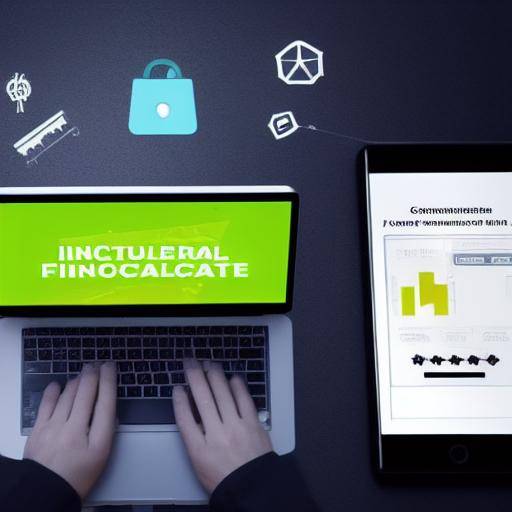
The security of financial transactions is fundamental in the current economic environment. With the advance of technology, fintech (financial technologies) have revolutionized the way transactions are made and manage money. In this article, we will explore the impact of fintech on the protection and security of financial transactions, as well as their innovation in this area.
Introduction
Currently, financial technologies, or fintech, are transforming the way people, businesses and countries manage their finances. The combination of technology and finance has generated a significant impact on the protection and security of financial transactions. Throughout this article, we will explore how fintech has improved security in transactions, innovations they have introduced and their impact on the protection of financial assets.
History and Background
The emergence of fintech dates back to the last decades of the twentieth century, when digitalization began to transform the way financial transactions were carried out. With the advent of the internet, financial operations gradually moved into the digital sphere. This marked the beginning of a new era in which the security of financial transactions became a central concern for consumers and businesses.
The emergence of cryptography and blockchain technology has revolutionized the way security in financial transactions is guaranteed. Furthermore, the adoption of biometric authentication systems, such as facial recognition and fingerprints, has led to the protection of financial transactions at an unprecedented level.
Analysis in Deep
Fintech has brought with it a number of security benefits, such as fraud reduction and cyber risk mitigation. However, they have also raised challenges, such as the need to protect the privacy of users and avoid potential security breaches.
Innovation in fintech has been a determining factor in improving security in financial transactions. The use of artificial intelligence and automatic learning has made it possible to detect and prevent fraudulent activities more efficiently, thereby strengthening the protection of financial assets. In addition, cloud-based security solutions have made it possible to safeguard financial information more effectively, while facilitating access to financial services.
Comprehensive review
Within the scope of fintech, solutions aimed at the security of financial transactions have experienced significant growth. Multifactor authentication systems and advanced encryption solutions have been developed to protect the integrity of transactions. In addition, the use of blockchain-based smart contracts has enabled the reliably automated and secure implementation of financial agreements.
However, despite advances in security, fintech also faces challenges from cybercriminals, who constantly seek vulnerabilities in digital financial systems. Continuous innovation is therefore crucial to ensuring protection and security in the digital financial environment.
Comparative analysis
Protection, security and innovation in financial transactions are closely related elements. Protection refers to the safeguarding of financial assets and user sensitive information, while security concerns the prevention of unauthorized access and fraudulent activities. Innovation, for its part, focuses on the introduction of new approaches and technologies to strengthen protection and security in financial transactions.
An example of this close relationship is the implementation of blockchain technology, which promotes a safe and transparent environment for financial transactions, offering robust protection against fraud and manipulation. Also, the application of artificial intelligence techniques in the detection of fraudulent activities has strengthened security in financial transactions, while promoting innovation in the early detection of cyber threats.
Practical Tips and Accessible Recommendations
To ensure security in financial transactions in the fintech environment, it is essential to follow a number of best practices:
- Use secure passwords and make periodic changes.
- Verify the authenticity of platforms and financial applications before making transactions.
- Keep up-to-date computer security and antivirus systems.
- Avoid the use of public Wi-Fi networks in financial transactions.
- Implement multifactor authentication whenever available.
Sector Information and Views of Experts
Financial security experts agree that the incorporation of advanced technologies in the field of fintech has significantly improved security in financial transactions. The incorporation of biometric protections, advanced encryption systems and the proactive detection of suspicious activities have strengthened user confidence in fintech. It is also expected that the adoption of emerging technologies, such as the Internet of Things (IoT) and quantum computing, will continue to drive innovation in financial security.
Case Studies and Practical Applications
The application of fintech in different industries has demonstrated the positive impact on the security of financial transactions. For example, in the electronic commerce sector, fintech-based payment solutions have significantly reduced fraud and provided merchants with greater protection against unauthorized transactions. In addition, in the financial services sector, fintech-based heritage management platforms have strengthened customer asset protection by implementing safe authentication processes and advanced fraud detection mechanisms.
Future Trends and Predictions
The future of financial transactions will be marked by continued innovation in financial technologies. Fintechs are expected to continue to introduce advanced security solutions, reinforced by automatic learning techniques and predictive analysis to anticipate and prevent cyber threats. In addition, the integration of biometry and universal authentication could become standards in the protection of financial transactions, ensuring an additional layer of security for users.
Conclusions
In conclusion, the impact of fintech on the protection and security of financial transactions has been significant. Through the implementation of advanced technologies, fintechs have strengthened the protection of financial assets, improved transaction security and encouraged innovation in fraud prevention. As the financial industry continues to evolve, fintech is expected to continue to play a key role in the protection and security of financial transactions.
Frequently asked questions
1. What are the main threats to security in financial transactions?
The main threats include identity theft, phishing, malware and denial of service attacks (DDoS). Fintech implements advanced solutions to mitigate these threats and protect financial transactions.
2. How can fintech ensure user privacy in financial transactions?
Fintech uses advanced encryption techniques and multifactorial authentication systems to safeguard the privacy of users and protect their financial information.
3. What impact does artificial intelligence have on the detection of fraudulent activities in financial transactions?
Artificial intelligence enhances early detection of fraudulent activities by analyzing patterns of behavior and transactions, identifying anomalies and alerting potential frauds.
4. How are fintech changing the security landscape of financial transactions?
Fintechs are introducing innovative solutions, such as biometry, biometric authentication and blockchain technology, which are revolutionizing the way financial transactions are secured and users' assets are protected.
5. What role do fintech play in the fight against financial fraud?
Fintech plays a key role in introducing advanced security solutions that include proactive detection of fraudulent activities, multifactor authentication and advanced encryption, which contributes to the reduction of financial fraud.
6. What is the future of security in financial transactions and how will fintech contribute to their evolution?
The future of security in financial transactions will be marked by the integration of emerging technologies, such as the Internet of Things, Quantum Computing and Biometric Technology, into fintech security solutions, which will ensure a higher level of protection and fraud prevention in the digital financial environment.
Concluding, the impact of fintech on the protection and security of financial transactions has been significant. Through the implementation of advanced technologies and innovative solutions, fintechs have strengthened the protection of financial assets and improved security in transactions, thus fostering the trust of users in the evolving digital financial environment.






















































